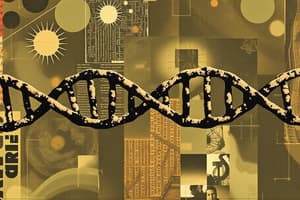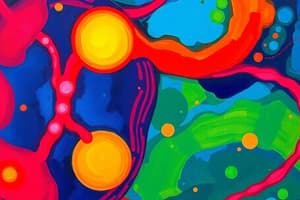Podcast
Questions and Answers
What are carbohydrates also called?
What are carbohydrates also called?
- Nucleic Acids
- Lipids
- Saccharides (correct)
- Proteins
What elements are carbohydrates made from?
What elements are carbohydrates made from?
Carbon, hydrogen, and oxygen
Which of the following elements is present in proteins?
Which of the following elements is present in proteins?
- Phosphorus
- Sulfur
- Calcium
- Nitrogen (correct)
What type of molecule is a lipid?
What type of molecule is a lipid?
What are the two main types of nucleic acids?
What are the two main types of nucleic acids?
What defines an organic molecule?
What defines an organic molecule?
Inorganic molecules are typically found in living things.
Inorganic molecules are typically found in living things.
What is dehydration synthesis?
What is dehydration synthesis?
What occurs during hydrolysis?
What occurs during hydrolysis?
What are enzymes?
What are enzymes?
Study Notes
Carbohydrate
- Composed of carbon, hydrogen, and oxygen.
- Includes monosaccharides (e.g., glucose) and disaccharides (e.g., sucrose).
- Commonly referred to as sugars.
Protein
- Organic compounds containing nitrogen, carbon, hydrogen, and oxygen.
- Highly diverse and essential for biological functions.
- Considered central to life processes.
Lipid
- Organic molecules that are insoluble in water but soluble in non-polar solvents.
- Characterized by being hydrophobic and lipophilic due to large non-polar regions.
Nucleic Acid
- Composed of one or two long chains of nucleotides, each made of a nitrogen base linked to a sugar phosphate.
- The two primary types are DNA and RNA; vital for genetic information storage.
Organic Molecule
- Typically found in living organisms and built from carbon atoms arranged in rings or chains.
- Other elements, such as hydrogen, oxygen, and nitrogen, are commonly attached.
Inorganic Molecule
- Generally simple molecules not normally associated with living organisms.
- Not all carbon-containing substances are organic; for example, diamonds are classified as inorganic.
Dehydration Synthesis
- A process where monomers join to form polymers, releasing water molecules as byproducts.
- Named for its mechanism of “putting together while losing water.”
Hydrolysis
- The chemical process where compounds break down through a reaction with water.
Enzymes
- Biological substances that act as catalysts in biochemical reactions.
- Essential for accelerating specific chemical processes in living organisms.
Studying That Suits You
Use AI to generate personalized quizzes and flashcards to suit your learning preferences.
Description
Test your knowledge of key biochemistry vocabulary with these flashcards. Learn important terms like carbohydrates and proteins, which are fundamental to understanding biological processes. Each card provides a definition to help reinforce your learning.




